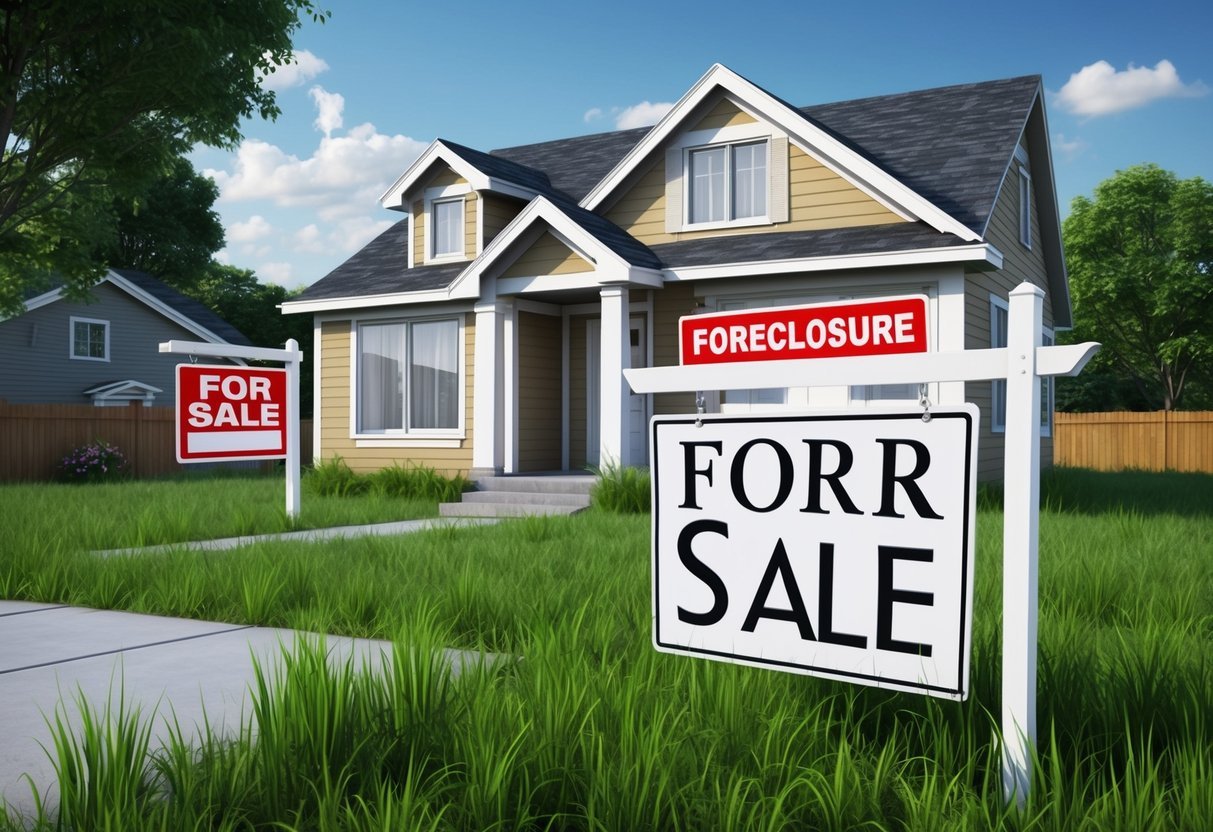In today’s competitive real estate market, finding foreclosure properties before they officially hit the market can be a game-changer for potential buyers and investors.
Searching for these opportunities requires a strategic approach, leveraging various methods to uncover potential deals early in the foreclosure process.

Our goal is to explore effective methods for identifying these hidden gems, allowing us to maximize our chances of acquiring valuable properties at potentially lower prices. By using these strategies, we can enhance our real estate portfolios and make informed decisions while navigating through the foreclosure market.
1) Network with Real Estate Agents
Connecting with real estate agents can be one of our most effective strategies to find foreclosure properties before they hit the market.
Agents often have direct access to listings and can be aware of potential foreclosures during the pre-market stage.
Working with agents who specialize in foreclosures can provide us with valuable insights and early tips.
These professionals know how to navigate the market and can alert us to opportunities as they arise.
Establishing strong relationships with multiple agents increases our chances of hearing about potential deals.
We should make it a point to attend industry events and engage with professionals who have experience in foreclosure properties.
It’s essential to be clear about our criteria and to communicate openly with our real estate contacts.
By doing so, we keep ourselves top-of-mind, making it likelier that they alert us to relevant properties quickly.
Real estate agents have access to tools like the Multiple Listing Service (MLS), which can provide us with comprehensive data.
Building these relationships not only opens the door to early information but also helps us leverage their expertise throughout the buying process.
We should also consider joining local real estate investment groups.
These communities often have agents who share our goals and can assist in finding pre-market foreclosure opportunities.
Explore Online Real Estate Auctions
In our quest to find foreclosure properties before they become widely available, online real estate auctions can be a valuable tool.
These platforms host a variety of foreclosure listings, offering us early access to properties not yet on the regular market.
Exploring these auctions enables us to potentially secure a property at a competitive price.
Accessing these auctions often requires creating an account on websites such as Auction.com.
As members, we can view detailed property information and participate in bids during the auction.
This process provides a direct line to potential deals and can be a strategic approach for serious investors.
Online auctions require due diligence.
We need to thoroughly research each property, including its history and market value, to make informed bidding decisions.
Utilizing the resources provided by these platforms allows us to assess both opportunities and risks more effectively.
Timing is another crucial factor.
Auction dates are usually set, and bidding can become competitive.
It’s essential for us to familiarize ourselves with the rules and timing of each auction to ensure we can act swiftly once we identify promising properties.
3) Join Local Real Estate Investment Groups

Joining local real estate investment groups can be a valuable strategy in our search for foreclosure properties.
These groups offer networking opportunities with like-minded individuals who have experience in the market.
By participating, we increase our chances of learning about foreclosure properties before they become widely known.
These groups often consist of both seasoned and novice investors who are eager to share knowledge and opportunities.
By engaging with this community, we can discover potential deals through shared insights and experiences.
Real estate investment groups also provide educational resources and workshops to enhance our understanding of the market.
This knowledge can be crucial in navigating the complexities of acquiring foreclosure properties.
In addition to educational benefits, these groups often have established connections with real estate agents, lenders, and other professionals.
Utilizing these relationships allows us to act swiftly on promising foreclosure leads.
Moreover, some groups take a collaborative approach by pooling resources to invest collectively.
This enables us to participate in larger ventures that we might not be able to pursue independently.
4) Check Government Websites for Listings

One effective way to find foreclosures is to explore government websites where these properties are often listed.
Government agencies maintain websites offering details on various foreclosure listings.
By visiting these platforms, we can gain access to properties before they are widely available.
HUD Home Store is one such valuable resource.
It lists properties acquired by the U.S. Department of Housing and Urban Development.
We can search by state, city, or specific address.
This tool allows us to locate foreclosed homes that may not yet be on the open market.
The U.S. Treasury Department’s auctions page lists foreclosed homes seized for tax reasons.
Frequently checking these listings can provide opportunities for early investment in properties.
We should consider exploring local government websites as well.
County and city offices may also release details about upcoming foreclosure sales or auctions.
Staying updated with these resources can give us an edge in acquiring properties efficiently.
Finally, we can look at Fannie Mae’s HomePath website.
This platform lists foreclosed properties owned by Fannie Mae.
Browsing regularly ensures we are informed of new listings in our desired areas.
5) Work with Foreclosure Listing Services

Working with foreclosure listing services is a strategic approach for those looking to identify foreclosure properties early.
These services specialize in aggregating information about properties that are at various stages of foreclosure and can provide us with exclusive access to a wide range of listings.
These services often include properties that aren’t widely advertised.
By leveraging their databases, we gain valuable insights not typically available through conventional real estate platforms.
Many of these listings come from bank websites, public records, and other sources that require diligent tracking and updates.
Another advantage is their alert systems.
Many foreclosure listing services offer notifications based on specific criteria we set, such as location or property type.
This means we can act swiftly and decisively when a potential property surfaces.
Using these services can save time and effort.
Instead of scouring multiple platforms, we can access comprehensive information all in one place.
This centralized access simplifies our search and significantly increases our efficiency.
Finally, some services offer additional tools to evaluate properties, such as estimated values and market trends.
This allows us to make more informed decisions about potential investments.
By partnering with reputable foreclosure listing services, we can ensure we’re always at the forefront of new opportunities.
Understanding Foreclosure Properties

Foreclosure properties offer unique opportunities and challenges in the real estate market.
By understanding the various types of foreclosures and assessing their potential risks and rewards, we can make more informed purchasing decisions.
Types of Foreclosures
Foreclosure properties can be categorized into different types, each with distinctive characteristics.
Pre-foreclosures are properties in the early stages of the foreclosure process, providing us a chance to negotiate directly with the homeowner before the bank takes full control.
Short sales occur when the lender agrees to accept an offer lower than the amount owed, typically when homeowners face financial distress.
Auction properties are homes sold to the highest bidder, offering potential bargains but often requiring immediate payment.
Real Estate Owned (REO) properties are owned by banks after failing to sell at auction and are listed like traditional homes but might be priced lower.
Knowing these categories helps us identify properties that fit our investment strategy.
Risks and Rewards
Investing in foreclosure properties involves both benefits and potential pitfalls.
A significant advantage is the possibility of purchasing under market value, which can lead to substantial profit margins upon resale.
These properties may also provide opportunities for renovation and increased market value.
However, foreclosed homes can come with risks, such as undisclosed liens, repair needs, or property damage.
We must conduct thorough due diligence, including title searches and professional inspections.
Additionally, competition for these properties can be intense, requiring quick decision-making.
By evaluating both the risks and opportunities, we can navigate the foreclosure market with confidence.
Legal Aspects of Foreclosure Properties

Understanding the legal aspects of foreclosure properties is crucial for anyone looking to invest.
This involves familiarizing yourself with the laws and nuances of contract negotiation.
Foreclosure Laws and Regulations
Navigating foreclosure laws can be intricate.
Each state has specific legislation governing the process, which means we must research the relevant statutes before proceeding.
These laws address timelines for notice, rights to cure defaults, and eviction processes.
Federal regulations may also come into play, offering additional protections to homeowners.
Laws vary significantly.
For example, some states require judicial foreclosures, necessitating court action, while others proceed non-judicially.
We need to understand these differences and how they affect the purchasing timeline and ownership transfer.
Compliance with these legal requirements helps avoid potential pitfalls and legal complications.
Negotiating Contracts
When it comes to negotiating contracts for foreclosure properties, it’s essential to proceed with caution.
These contracts often differ from traditional real estate agreements.
We must thoroughly review terms related to property condition, title issues, and potential liens.
Negotiations may involve direct dealings with banks or auction companies, which can require us to have a comprehensive understanding of property valuation and market trends.
It’s crucial to clearly outline any contingencies and due-diligence periods within the contract to protect our interests.
An experienced real estate attorney can provide valuable guidance during these negotiations, ensuring we secure the best possible deal.
Financial Analysis of Foreclosure Investments

When we analyze foreclosure investments, we must concentrate on several crucial factors. Cash flow projections are a key consideration.
Generating positive cash flow from rental income or reselling is essential for a profitable venture.
It’s important to account for carrying costs such as property taxes, insurance, and maintenance.
These can eat into profits if not carefully managed.
We need to assess the property’s current market value compared to the purchase price.
Acquiring the property at a significant discount can lead to higher potential returns.
Understanding rehabilitation costs is vital.
Renovations and repairs can vary widely—be sure to budget accurately for unexpected expenses.
Risk assessment is another essential aspect.
Market fluctuations and the property’s condition can affect our investment’s success.
An informed risk calculation guards against potential pitfalls.
Frequently Asked Questions

In exploring foreclosure properties, we focus on strategies like networking and leveraging various resources to discover opportunities before they become widely available.
What are the key strategies to identify pre-foreclosure properties?
To identify pre-foreclosures, we can tap into our real estate network and connect with agents who have insights into upcoming listings.
Another approach involves checking public records for properties that have received foreclosure notices.
Can you find pre-foreclosure listings without a charge, and if so, how?
Yes, there are free resources available for finding pre-foreclosure listings.
Local government websites often provide access to public records.
Networking with real estate professionals may also yield leads without any cost.
What are the alternatives to finding foreclosure properties outside of Zillow?
Besides using Zillow, exploring online real estate auctions and joining local investment groups can be fruitful.
These platforms may provide access to exclusive listings and insider information on properties before they appear on mainstream channels.
How can you discover pre-foreclosure homes through the MLS system?
Utilizing the MLS system involves partnering with a real estate agent who has access to these listings.
Agents can set up tailored alerts for properties in pre-foreclosure stages, keeping us informed about new opportunities.
What are the steps to locate pre-foreclosure homes in your local area?
First, research the local real estate market and speak with agents who specialize in foreclosures.
Attending local real estate forums or meetups can also be beneficial in gathering information on properties in pre-foreclosure.
How can one find information on bank-owned properties that are available for purchase?
You can often find bank-owned property information on bank websites or through REO (real estate owned) departments.
Additionally, agents who specialize in bank-owned properties can provide further insights and access to these listings.

